Pantry Power
Make Healthy Home Cooking a Habit by Stocking the Essentials
Americans spend less time cooking than people in any other developed nation. Only 60 percent of U.S. dinners were cooked at home last year, and about one-third of Americans eat fast food weekly. http://www.washingtonpost.com/blogs/wonkblog/wp/2015/03/05/the-slow-death-of-the-home-cooked-meal/ http://www.gallup.com/poll/163868/fast-food-major-part-diet.aspx
There’s nothing wrong with eating out occasionally. But studies and anecdotal evidence suggest that home cooking encourages healthier eating. http://www.ncbi.nlm.nih.gov/pmc/articles/PMC3223413/#bib12 In one study of 9,500 people, the group who cooked the most consumed more fiber, fewer carbohydrates, and less sugar. http://civileats.com/2014/11/17/toss-those-take-out-menus-new-study-says-cooking-makes-us-healthier/ “Cooking is probably the most important thing you can do to improve your diet. … It’s the collapse of home cooking that led directly to the obesity epidemic,” says Michael Pollen, food activist and author of Cooked: A Natural History of Transformation.http://opinionator.blogs.nytimes.com/2013/04/17/pollan-cooks/?hp
Cooking from scratch not only encourages healthier eating but can also help save money, and it may be better for the environment, especially if a home chef chooses sustainable ingredients when possible. http://abcnews.go.com/blogs/lifestyle/2014/01/real-money-fast-food-versus-home-cooked-meals/ http://www.forbes.com/sites/bethhoffman/2012/06/18/whats-so-great-about-cooking-four-reasons-and-resources-to-diy/ The best reasons to cook at home are simple: it’s pleasurable and the results are often delicious. In fact, 80 percent of Americans say that they enjoy cooking.
So why are people taking to the kitchen less regularly? Perhaps because it requires planning. A spin through the drive-through or stroll down the chip aisle is tempting when the cupboards are bare. Thus, a well-stocked pantry, refrigerator, and freezer can help make cooking on a regular basis easier and more enjoyable. The first step is to take stock of what’s already there.
Assess the Reserves
Nearly all food products can go bad, and less-than-optimal conditions can speed up the process. Take inventory by examining and smelling whole grains, flours, oils, nuts, seeds, herbs, and spices. Toss anything that looks bad, smells rancid, is expired, or has lost color or potency.
Then list what needs to be replaced and what additional staples will make cooking easier. Focus on items that can be incorporated into multiple meals. Stumped? List 10 meals that you regularly prepare (or would like to) and the required ingredients. Though many items should be bought fresh, such as milk products and produce, almost everything else are excellent candidates to buy in large quantities and keep on hand in a pantry, refrigerator, or freezer.
Stock the Staples
Use the following list of basic ingredients and storage tips to guide your own individualized inventory of essentials.
Note: the expiration dates are estimated assuming that a pantry meets optimal conditions. Food can have a significantly shorter shelf life in warmer, brighter, and humid environments, such as a cupboard near the stove, hot pipes, heater, or refrigerator.
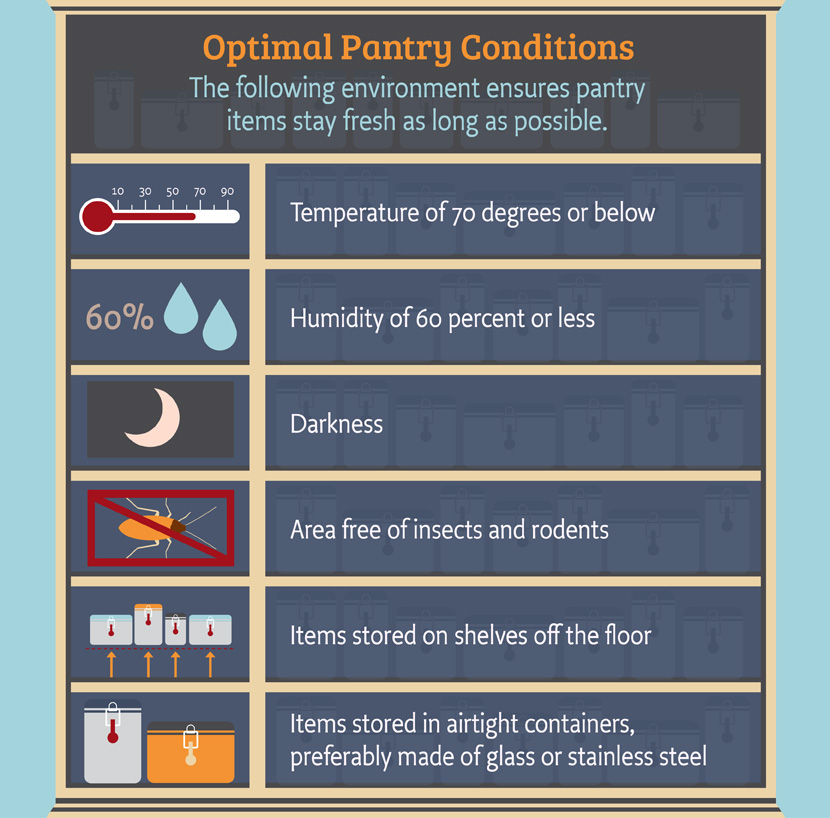
Dry Goods
Transfer dry goods to airtight glass or stainless steel containers and mark with purchase dates. Weevil larvae, the microscopic eggs of small insects, are often present in grain products. To eradicate them, freeze flours for four days before storing. http://www.foodsafetymagazine.com/magazine-archive1/junejuly-2005/7-simple-rules-for-effective-and-hygienic-dry-goods-storage/
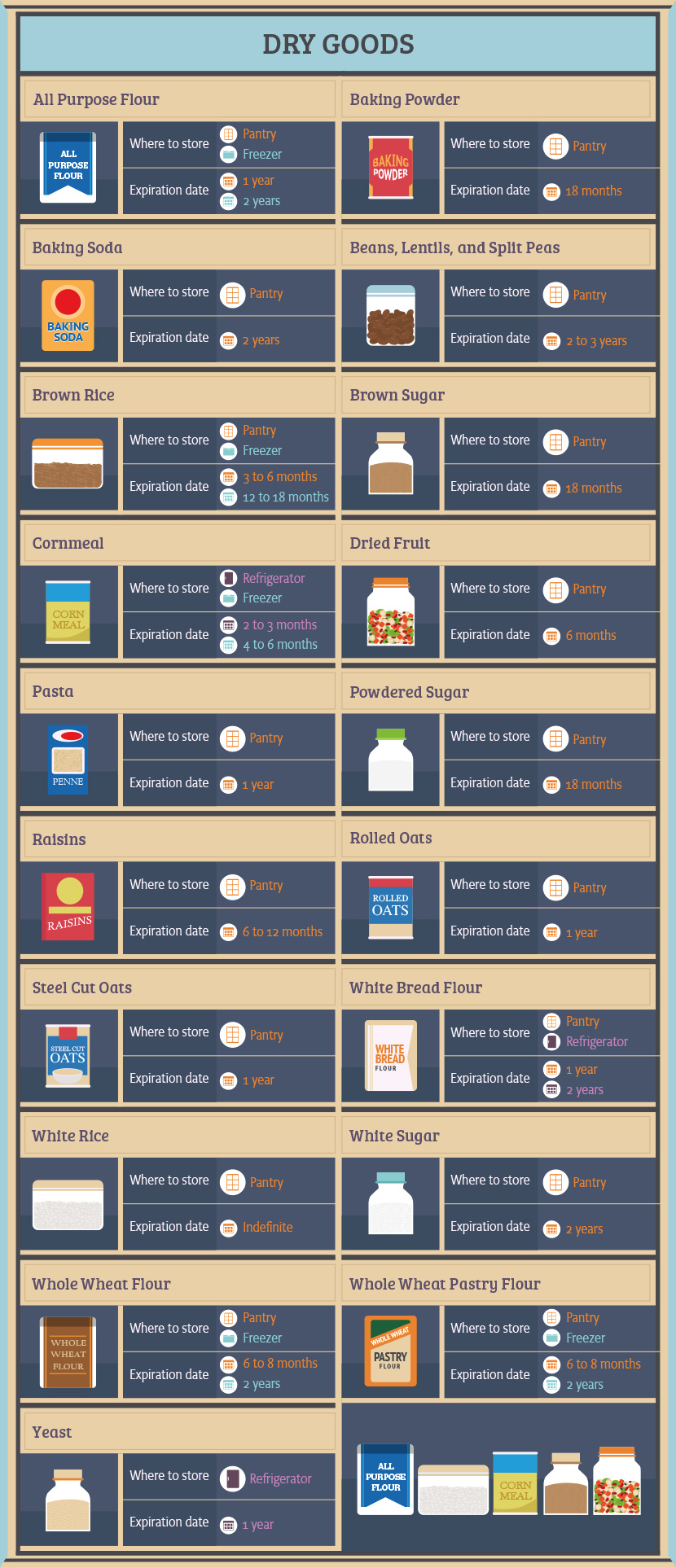
Dry Herbs, Spices, and Seasonings
For the best bargains and freshness, buy seasonings in the bulk section and transfer them to small, airtight glass jars away from the stove. Buy spices whole when possible and grind with a coffee grinder as needed. Keep larger quantities of frequently used seasonings, such as salt, pepper, cinnamon, and chili powder. For the rest, buy in small quantities or store larger quantities in the freezer and transfer them to the spice rack as needed. http://www.livingwellspendingless.com/2015/04/13/store-organize-spices/
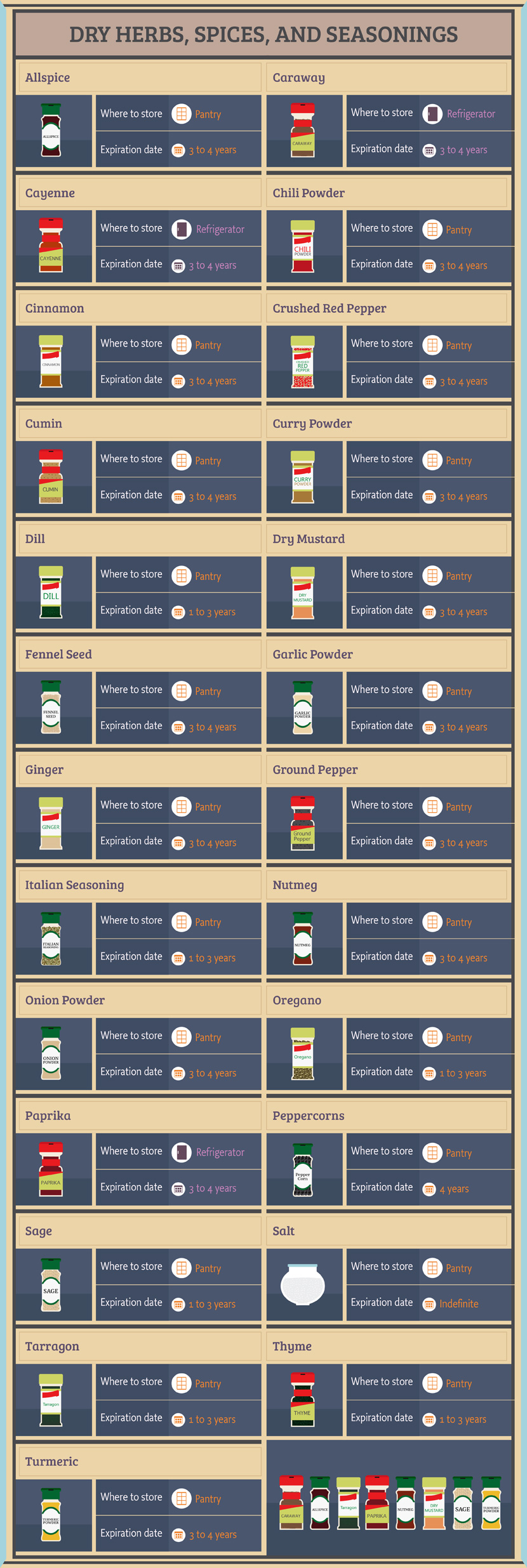
Oils, Nuts, and Seeds
These foods are fragile and degrade when exposed to air, light, and high temperatures. http://static.oliveoiltimes.com/library/Olive-Oil-Storage-Conditions.pdf For that reason, buy only what you can use before the expiration date. Keep water out of oil jars to prevent mold growth. Smell oils, nuts, seeds, and nut butters before eating and toss any that smell rancid. http://www.dallasnews.com/lifestyles/health-and-fitness/health/20120423-danger-in-the-kitchen-beware-rancid-food-in-your-cupboards.ece
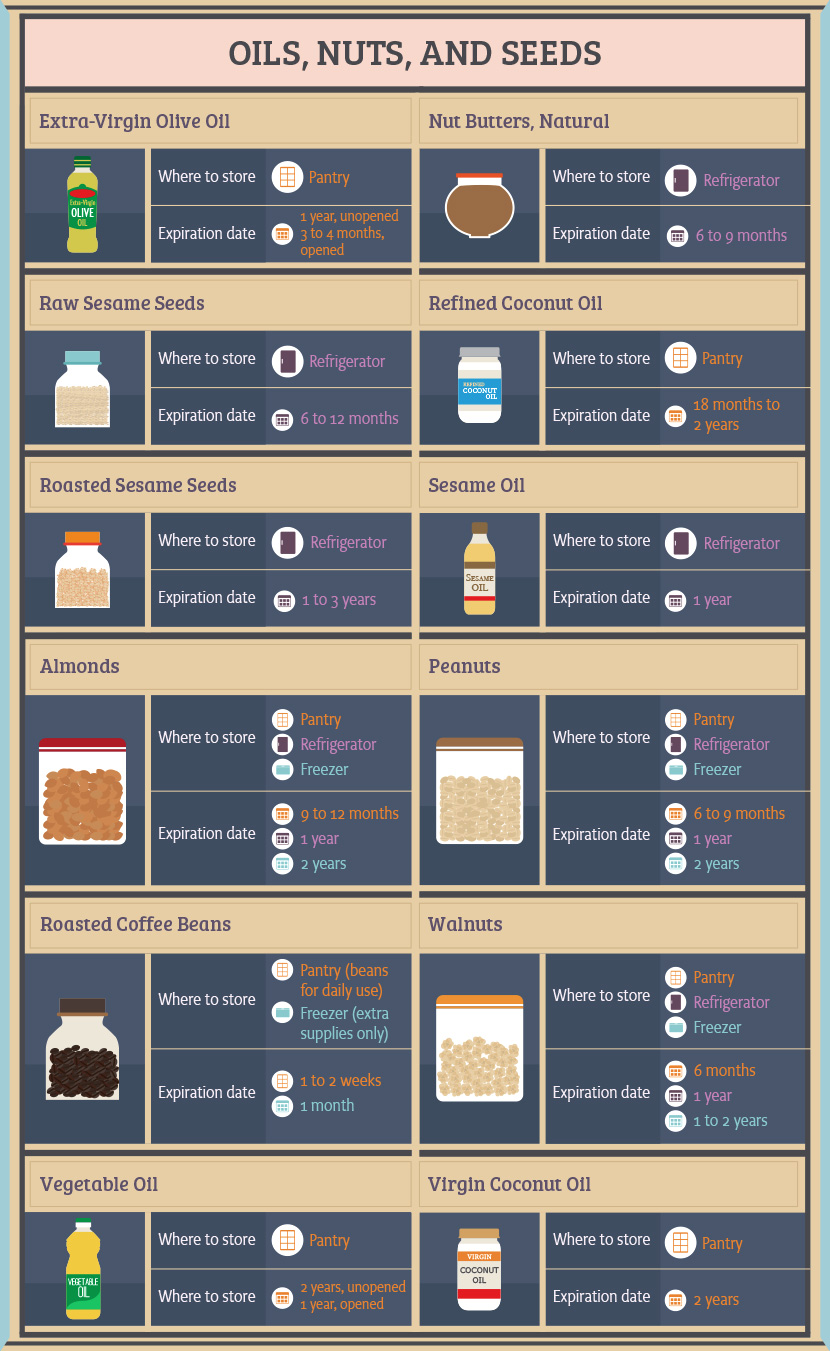
Liquid Condiments
With a few exceptions (notably broth, mayonnaise, and horseradish), opened condiments can be kept at room temperature, but most of them retain flavor and last longer in the refrigerator. Store condiments in the door of the fridge, which is too warm for milk or eggs. http://www.thekitchn.com/the-best-way-to-organize-your-fridge-tips-from-the-kitchn-48286 Shake or stir before using.
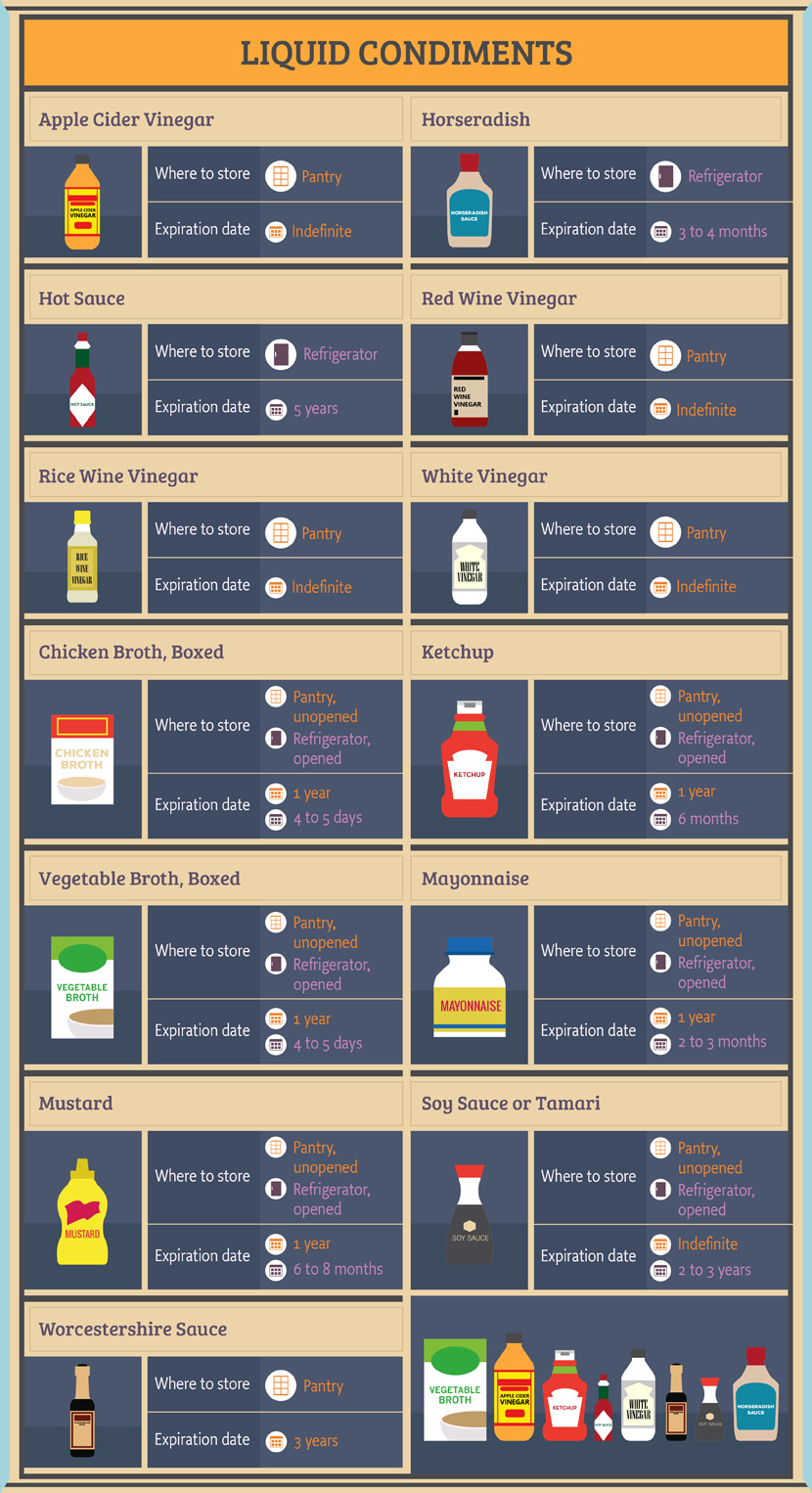
Canned and Jarred Goods
These items can have long shelf lives, but they are safest, most nutritious, and taste best when eaten within the first year of storage. As a rule, high-acid foods such as tomatoes and sauerkraut expire before low-acid items like beans. http://www.cals.uidaho.edu/edcomm/pdf/PNW/PNW0612.pdf To preserve flavor in leftover canned goods, transfer them to a glass or plastic storage container for refrigeration and eat within three to four days. http://www.nestle-family.com/nutrition-for-all/english/all-you-need-to-know-about-canned-foods_436287.aspx
Spoiled canned and jarred food may contain the dangerous botulinum toxin, which causes a rare but serious illness if ingested. To be safe, examine cans and jars before opening. Do not open or eat the contents of:
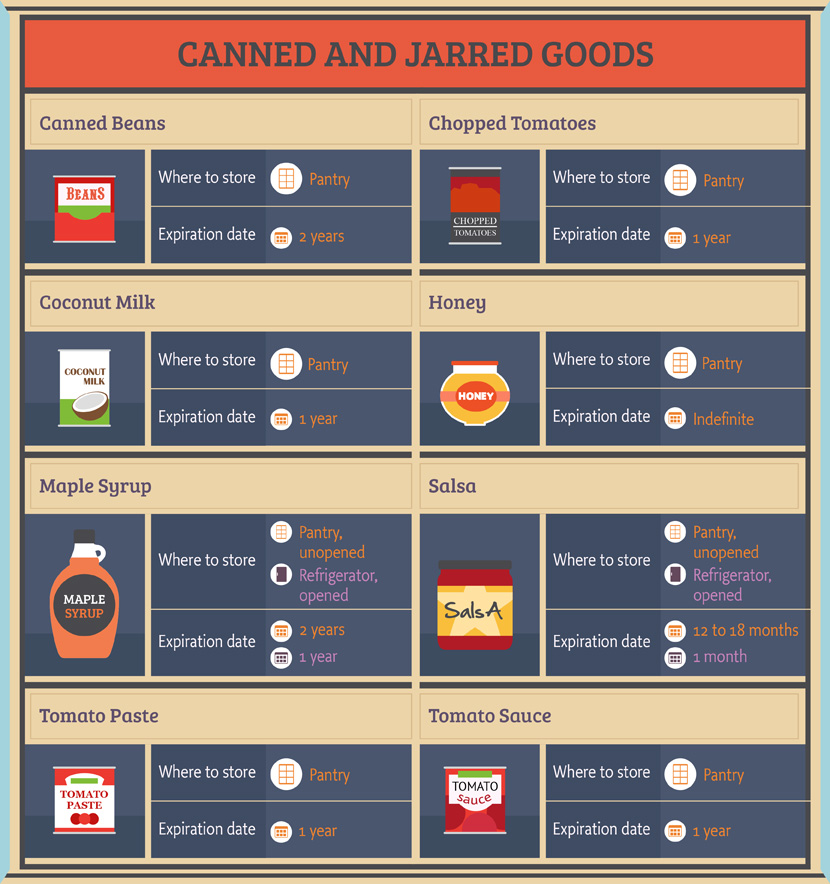
Root Cellar Vegetables
Store onions, garlic, and shallots in paper bags punched with holes. Keep potatoes in covered, ventilated baskets, boxes, or bags. They can be kept in the pantry, but for extended freshness, store them in a cold room, such as a basement, that stays between 40º and 60º.
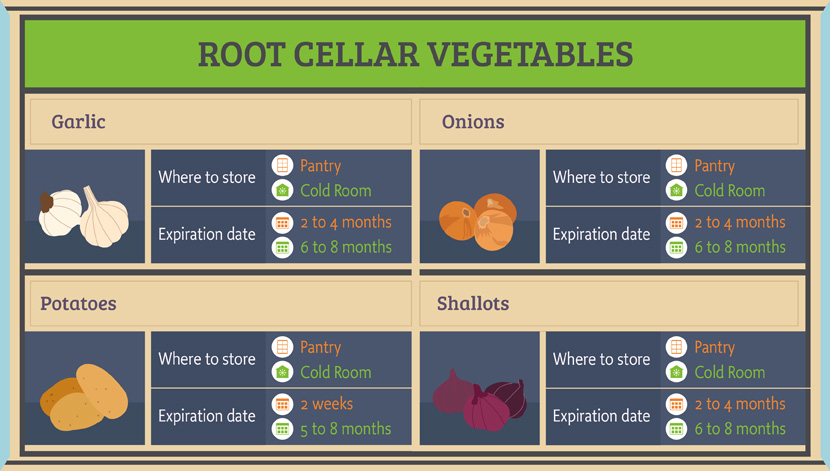
Once you have a list, it’s time to shop. Ingredients in grocery store bulk bins are often cheaper and fresher than pre-packaged ingredients. A local co-op, buying club, or wholesale club may offer even better deals on bulk items. Filling up the pantry may feel daunting and expensive if the shelves were sparse to begin with. Remember, buying in bulk can save money in the long run, especially if it prevents pricy restaurant trips. But items must be stored properly – and used before they expire – to get the most bang for your buck.
Create a system to take regular inventory and routinely replenish supplies. Tech-savvy home chefs can download one of the many pantry-management smart phone apps designed to help home cooks take stock of ingredients. Old-fashioned pen and paper works great, too. Just make a list of items that need to be stocked monthly, quarterly, yearly, and longer. Then routinely check the quantity and quality of supplies.
Cooking is a creative pursuit that activates the senses and relieves stress.http://www.nydailynews.com/life-style/cooking-therapy-making-meals-helps-reduce-stress-heal-broken-heart-benefits-article-1.206839 It encourages people to connect with their food and nature and gather around the table to savor delicious meals. A well-stocked pantry expands options and allows for inventive meals all week long.
Embed the article on your site

